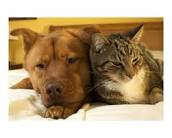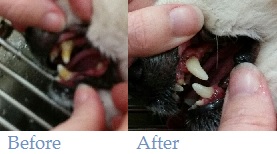Adult Dog and Cat Care (1 – 6 Years of Age)
 During a pet’s adult years, both dogs and cats need an annual examination, vaccinations, parasite screenings and parasite prevention. We recommend parasite prevention be given year round to all dogs and cats in the household. We also recommend dental cleanings on an as needed basis. These are pet care elements that can help to keep your pet healthy for a long lifespan.
During a pet’s adult years, both dogs and cats need an annual examination, vaccinations, parasite screenings and parasite prevention. We recommend parasite prevention be given year round to all dogs and cats in the household. We also recommend dental cleanings on an as needed basis. These are pet care elements that can help to keep your pet healthy for a long lifespan.
Even if your pet appears healthy, an annual examination is vital to giving your veterinarian a reference for what is normal for your pet. In addition, pets are very good at hiding illness and often many things that pet parents may consider “normal” are actually early signs of illness in a pet.
Vaccinations are recommended to help protect your pet against diseases. Some vaccinations are required by the city and others are required by boarding and grooming facilities. There are also additional vaccinations that are available and are given on an as needed basis to animals that are at an increased risk for those diseases. During your visit, we will discuss what vaccinations are actually needed for your pet based on their risk factors.
Yearly Dog Vaccines Include
DA2PPC, Bordetella and Rabies. Leptospirosis and Lyme are also available for at risk animals.
Yearly Cat Vaccines Include
FVRCPC, Rabies and FeLV for at risk cats or cats not previously vaccinated for FeLV.

Parasite screenings are recommended for dogs and cats to screen for both intestinal and blood born parasites. Many of these parasites are zoonotic, meaning that they can be passed on to people. We can check for a number of parasites with a few simple tests. It is important for us to know if these parasites are present so we can properly protect your pet and your family.
Parasite prevention is important to prevent intestinal worms, heartworms, fleas and ticks. There are many different brands and types available but not all work the same. Over time, parasites develop populations that are resistant to the chemicals in preventatives. This means that some preventatives are not as effective as they once were. We recommend preventatives that are currently providing the best protection.
Dental cleanings are recommended on an as needed basis and are performed with a short acting injectable anesthetic. We have pet toothpastes available to help maintain oral health between cleanings. Never use a toothpaste designed for people on your pet. These toothpastes contain fluoride, which can be toxic to your pet.
Additional examinations should be performed if your pet shows signs of illness. Common signs of illness include changes in eating or drinking habits, changes in urination or bowel movements, new masses, swellings or growths, changes masses or growths that were previously present, vomiting, diarrhea, coughing, licking or chewing, formations of sores or rashes, hair loss, discharge from the nose or eyes, changes in the appearance of the eyes, or any other abnormalities that you may notice.

